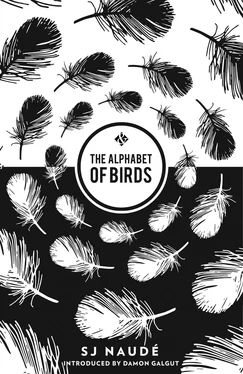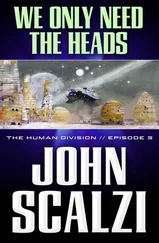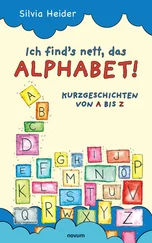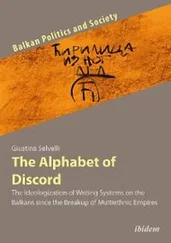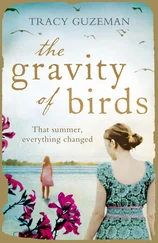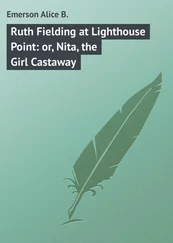‘Remind me of all the terrible sounds.’ It is Fred, appearing from behind the sheet. Her eyes are wide. It looks as if pure noise could escape from her head.
‘Well, there are six noise families, according to Russolo. First there are the roars, which include thunderings, explosions, hissing roars, bangs and booms. Then there are the whistling sounds, such as hisses and puffs. Following those are the whispers — murmurs, mumblings, mutterings and gurgling. The screeches, then, are the creaking sounds, the rustlings, buzzing, crackling and scraping. Further categories are the voices of animals and people: shouts, screams, shrieks, wails, hoots, heaving and sobs. Finally, there are the noises of percussion on, for example, metal, wood, skin, stone or clay.’
How he likes Tita! Chris thinks. When she speaks, it is with real concentration. She is focused on her listener: rather than imparting something, she is tuning her ear to his frequency.
‘What’s the subtitle of what you’re writing?’ Tom asks Tita, but it is Chris he is looking in the eye.
She looks down, as if wanting to divert attention from herself. ‘Something like “Noise, War and Loss”, but it’s provisional. Something more subtle will present itself. But it definitely needs to involve war,’ she says. ‘For the Futurists, war was the height of artistic expression.’
‘So, what I in fact intend to do is to trace the musical history of the twentieth century,’ she says, ‘searching for the moment’ — she draws a line on the sheet and presses with her finger at random points — ‘where all the major narratives, the big plans for the future, suddenly vanished like the morning mist.’
Fred removes the sheet from her face.
‘The brave, cruel future … ’ Chris says.
‘And,’ Tita continues, ‘I then try to hear the echoes of that collapse, try to read it like tea leaves …’
‘Is it too simple to say that moment was one of the two wars?’ Chris asks.
‘All those men — the music people and the warmongers — with their manifestos and tracts, their declarations and objectives!’ Fred calls out.
‘Oh, but their bravery was precious too,’ says Tita. ‘What they could not predict was what would follow noise, the silence that comes after collapse.’
Tom aims another wild smile in Chris’s direction, as if wanting to undercut the pompousness of the conversation.
‘We’re starting to get old, aren’t we?’ Fred says unexpectedly, looking at the cold coffee on the bedside table.
She sits forward urgently, as if she has had an important thought. ‘Come and live here,’ she says, ‘both of you, here with us. There’s more room than anyone could ever need. Yes, and then we’ll make’ — she gestures excitedly to Chris, to Tom, to Tita, to herself — ‘a house full of children. Imagine the scene: cacophony from morning till the eve, summer breakfasts by the canal, soccer in the garden at dusk, chapped knees and grazed elbows … and an orchestra, yes, enough children for an entire little orchestra!’
‘I can see the orchestra before me now,’ Tom pipes up drily. ‘The four of us, on our passeggiata in the shade, happening upon them where they have petrified in the dusk: in complete silence, frozen screams on innocent faces. Arms and instruments reaching towards the heavens. A statue representing the heroic masses …’
His voice is unexpectedly dangerous. Both Tita and Fred look hurt for a moment. But then the lines of Tita’s face sharpen. ‘I have something to show you,’ she says. ‘Come!’ She jumps off the bed and beckons.
They follow. Behind her, they climb the narrow wooden stairs that lead up from the bedroom.
In the attic they have to bend their heads away from the slanted ceiling. Tita looks as if she is bent double. A naked bulb is swaying between them, their heads close together.
‘What follows now, a conversation with the dead?’ Tom wants to know.
Tita ignores him. ‘It is generally accepted,’ she says, and her bone structure is casting sharp shadows, ‘that all Russolo’s Intonarumori were destroyed during the war. But … ’ She pauses for effect, then lifts a black sheet from the shape between them. The wooden box is dust-free, the megaphone of the loudspeaker smooth and shiny.
‘Don’t!’ she says, and lays her hand on Tom’s forearm when he immediately reaches for the crank. ‘It hasn’t worked for a long time; the internal mechanisms are immensely fragile.’
‘It is one of the smaller models,’ she continues, ‘but it is not the only one in existence, either. In the 1970s there was even a chamber orchestra that met in secret here in Milan to play on the handful of surviving Intonarumori. From all over performers assembled here, and at night, in abandoned warehouses, they would—’
‘Bedtime,’ Fred says suddenly, and blinks her little bushbaby eyes.
Chris and Tom’s room is on one of the two unrestored middle floors, not on the canal side. The cast iron of the radiators is cool against Chris’s fingers. He tries to open the curtainless sash window, but it sticks. A security light shines into the room from the industrial yard. When they stand opposite each other, naked now, their penises are heavy in the stale air.
Tom pins Christiaan against the mattress. As the air is forced from his lungs, he is flooded with joy. They travel across the bed in wrestling movements, taking turns to rise and push the other down. Their bodies, so Chris imagines it, are building fabulous towers. Slowly, Chris gains the upper hand. When his back arches above Tom’s like a cat’s, he can feel his spine exposing itself to the stars.
Sleep washes over Chris in waves. He dreams of a blue sky that is divided into mosaic tiles. Then it becomes murky, as if a cataract were shifting over it. In the dream, he realises that he is looking through the eyes of the dead child in Tom’s story. In the canal, below the ice.
He wakes up after midnight. He should ask Tom for a photo of the drowned child. He tosses and turns, thinking of the nocturnal performances on Intonarumori in the seventies. He would have liked to hear more from Tita about this. He feels a kinship with these underground performers. Nostalgia is paralysing his muscles, as if he had been there too. His yearning for these people with their noise machines in unfamiliar industrial spaces causes his sex to stir like a snail against Tom’s back.
Tom wakes up. His limbs move towards Chris as if through water. Initially he resists Tom. He relaxes and they accelerate: they become two smooth, pure objects, severed from their youth, from all ties and expectations; behind them, only the black heavens.
Later they wake up again. Chris thinks he can hear something: perhaps the water level in the canal is rising, perhaps the machine in the attic has started working.
‘Who are you?’ Tom asks in the dark.
‘What do you mean?’ Chris asks.
‘Tell me.’
‘Hmm, not sure what you want to know.’ He considers an answer. One revelation would be as arbitrary as another. A man looking for his bicycle?
‘I live in London. Academic. Art history, early modernist architecture and sculpture. Not a very fashionable field.’ How cerebral, Chris thinks, even in this sleep-drenched moment.
‘More,’ Tom demands.
Chris can smell Tom, and there is something familiar and incendiary in the smell. ‘If you must know, I’m working on an article called “Boccioni, Futurism and the aesthetic of Afrikaner Nationalism”, Umberto Boccioni being a sculptor who worked early last century, of course.’ Perhaps, Chris thinks, he should not have said ‘of course’.
Tom doesn’t say anything, just becomes more fragrant.
Chris breathes deeply and says: ‘Yes, isn’t it strange where ex-South Africans pop up these days and which subjects and worlds they join together?’
Читать дальше
